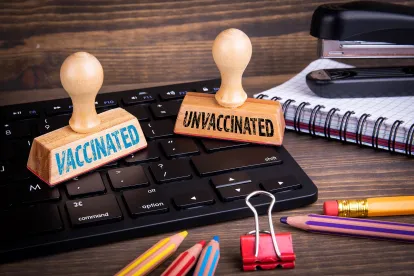Late on October 28, 2021, the Illinois legislature took steps to severely limit challenges to COVID-19 prevention measures. The legislature amended the Illinois Health Care Right of Conscience Act, 745 ILCS 70/1 et seq. (the "Act"), to prohibit the Act from being used as a tool to challenge COVID-19 prevention measures implemented by any person or entity. The Act allows an action for treble damages to those who are discriminated against on account of their refusal to accept or participate in medical treatment. The new amendments clarify that no action will be allowed when the refusal to accept treatment involves steps taken to reduce the risk of COVID transmission. The full text of the amendment may be found here.
The Act was originally passed in response to Roe v. Wade, with the intention of protecting health care workers from having to participate in abortions or other procedures that offended their religious principles. The Act was broadly phrased to include not only religious objections, but also conscientious objections that are part of a "set of moral convictions that … arises from a place in the life of its possessor parallel to that filled by God among adherents of religious faiths." The Act prohibits discrimination of any kind by any person on account of a person’s refusal to participate in delivering or accepting medical services based on a conscientious objection. Recent cases had held that the anti-discrimination ban was absolute and not subject to the concepts of "reasonable accommodation" or "undue hardship" that apply to claims of disability or religious discrimination. Thus, an employee refusing to comply with a mandatory vaccination policy based on a claim of religious belief could argue that any effort by the employer to limit their activity (social distancing) or take other precautions (masking/testing) due to their unvaccinated status was unlawful discrimination under the Act without regard to whether the lack of compliance constituted an undue risk to others, or the additional restrictions were reasonable.
With the recent amendments, challenges to COVID-19 prevention measures will no longer be permissible under the Act but will now have to be brought under federal laws such as Title VII or the ADA, or the Illinois Human Rights Act. While these laws prohibit religious and disability discrimination in employment and in places of public accommodation/education, proving a violation is much more difficult than it would have been under the Act. Thus, employers will still need to carefully weigh requests for religious or medical exemption from COVID-19 prevention measures but can reject those requests which result in undue burdens or unreasonable accommodations.
It is widely expected the Governor will quickly sign the Act and the amendment will become immediately effective.





 />i
/>i
